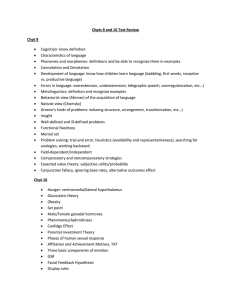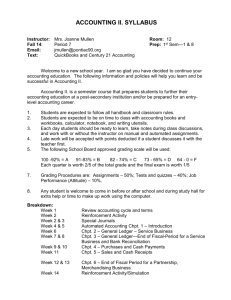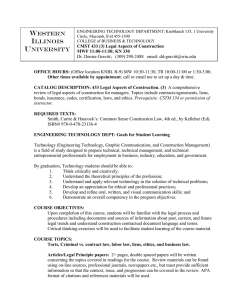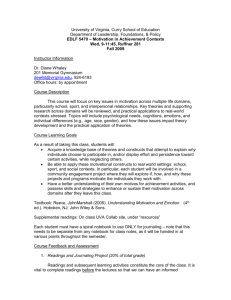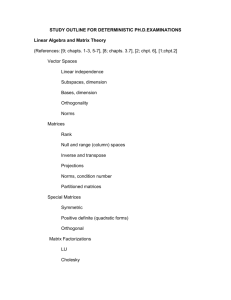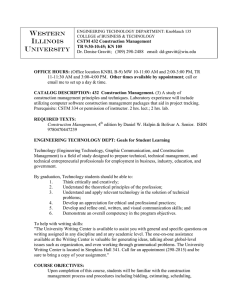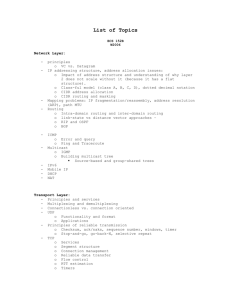Document 10768434
advertisement
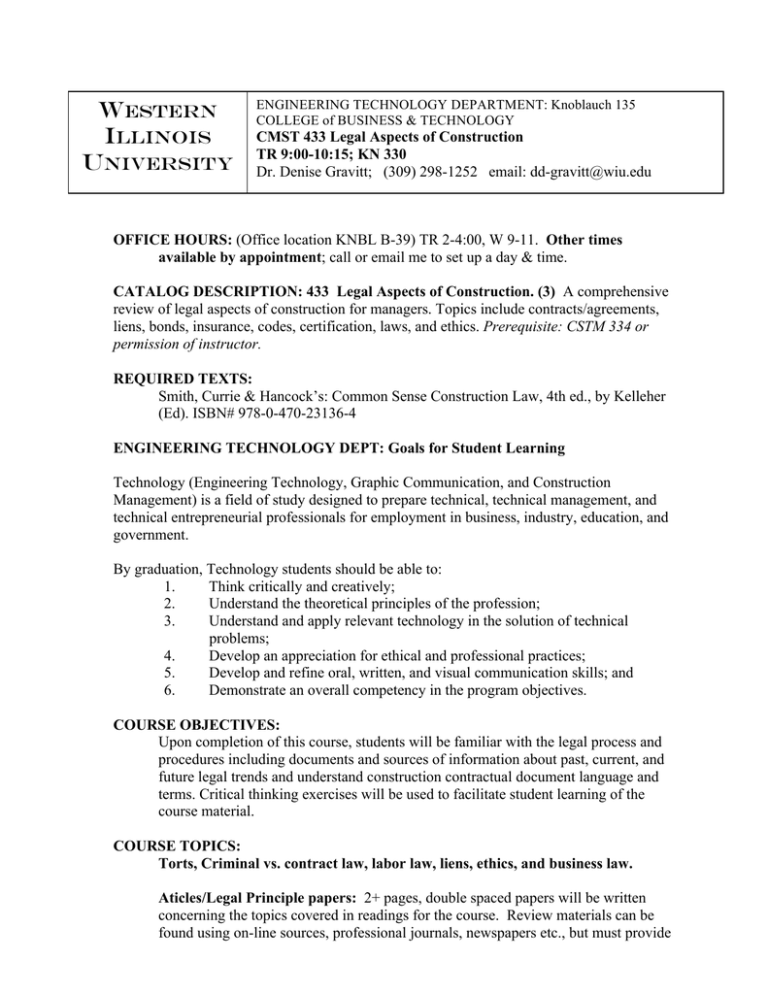
Students may tape class sessionsTECHNOLOGY if they get priorDEPARTMENT: permission of the instructor. ENGINEERING Knoblauch 135 WESTERN Illinois University COLLEGE of BUSINESS & TECHNOLOGY CMST 433 Legal Aspects of Construction TR 9:00-10:15; KN 330 Dr. Denise Gravitt; (309) 298-1252 email: dd-gravitt@wiu.edu OFFICE HOURS: (Office location KNBL B-39) TR 2-4:00, W 9-11. Other times available by appointment; call or email me to set up a day & time. CATALOG DESCRIPTION: 433 Legal Aspects of Construction. (3) A comprehensive review of legal aspects of construction for managers. Topics include contracts/agreements, liens, bonds, insurance, codes, certification, laws, and ethics. Prerequisite: CSTM 334 or permission of instructor. REQUIRED TEXTS: Smith, Currie & Hancock’s: Common Sense Construction Law, 4th ed., by Kelleher (Ed). ISBN# 978-0-470-23136-4 ENGINEERING TECHNOLOGY DEPT: Goals for Student Learning Technology (Engineering Technology, Graphic Communication, and Construction Management) is a field of study designed to prepare technical, technical management, and technical entrepreneurial professionals for employment in business, industry, education, and government. By graduation, Technology students should be able to: 1. Think critically and creatively; 2. Understand the theoretical principles of the profession; 3. Understand and apply relevant technology in the solution of technical problems; 4. Develop an appreciation for ethical and professional practices; 5. Develop and refine oral, written, and visual communication skills; and 6. Demonstrate an overall competency in the program objectives. COURSE OBJECTIVES: Upon completion of this course, students will be familiar with the legal process and procedures including documents and sources of information about past, current, and future legal trends and understand construction contractual document language and terms. Critical thinking exercises will be used to facilitate student learning of the course material. COURSE TOPICS: Torts, Criminal vs. contract law, labor law, liens, ethics, and business law. Aticles/Legal Principle papers: 2+ pages, double spaced papers will be written concerning the topics covered in readings for the course. Review materials can be found using on-line sources, professional journals, newspapers etc., but must provide sufficient information so that the context, issue, and progression can be covered in the review. APA format of citations and references materials will be used. Mediations: There will be three mediation sessions. The class will be broken up into three groups, each will take a turn being the mediators, the owners, and the contractors so you will gain experience using the legal terms and logic in real world situations. Further requirements for the mediation sessions and grading procedures will be handed out in class. Reading Lists and resources will be handed out separately. COURSE REQUIREMENTS: • • • • Each student is expected to read all assignments and write a summary journal entry on the topics read. Two copies of the assigned homework should be printed- one to turn in the at the BEGINNING of the class, one for the student to keep and update as the class progresses. Grades will be assigned based upon completeness of work, grammar, spelling etc. Each student is expected to attend class lectures, sessions with speakers, and exams when scheduled. FINAL EXAMINATION: Thursday May 12, 10-11:50 AM. See Course Calendar. Open book, notes etc. The student will complete all assigned individual activities and turn them in on the due date. Late work and emailed work will not be accepted for grading unless the student has a WIU approved absence. It is the instructor’s responsibility to provide an atmosphere conducive to learning. This means that I will not allow cell phones or iPODs (any MP3 players) to be used during class- if I see them or hear them they will be mine for the duration of the class. Nor will I allow eating or reading of papers, or side discussions with other students. Late students may not be admitted to the classroom. I expect everyone to act professionally. Thus, I will also not allow swearing or profanity, rude or disparaging jokes or behavior in class. You will get one warning, and after that if you do not correct your speech or behavior you will be asked to leave the classroom. GRADING: 3 Exams Final Exam* Optional Hmwk Article/Legal papers Mediations Presentation Attendance/Participation 15 % ea. 5% 15% 15% 10% 10 % 100% * Final exam counts as one of the best 3 of 4 exams used to calculate student course grade. Final grade scale is below. No rounding up of percentages will occur. GRADES BREAKDOWN: *A+ A AB+ B B- (97.0% - 100%) (93.0% - 96.9%) (90.0% - 92.9%) (87.0% - 89.9%) (83.0% - 86.9%) (80.0% - 82.9%) C+ C CD+ D D- (77.0% - 79.9%) (73.0% - 76.9%) (70.0% - 72.9%) (67.0% - 69.9%) (63.0% - 66.9%) (60.0%- 62.9%) NOTE: WIU does not count A+. Any grade above 93% will be reported as an A. A temporary symbol of I (Incomplete) for a course may be given only when a student, due to circumstances beyond his or her control, has been unable to complete the course requirements within the official limits of the term. The circumstances must be documented to the instructor’s satisfaction. ACADEMIC INTEGRITY: Preamble Western Illinois University, like all communities, functions best when its members treat one another with honesty, fairness, respect, and trust. Students have rights and responsibilities (http://www.wiu.edu/provost/students/) and students should realize that deception for individual gain is an offense against the members of the entire community, and it is the student's responsibility to be informed and to abide by all University regulations and policies on Academic Integrity. Plagiarism, cheating, and other forms of academic dishonesty constitute a serious violation of University conduct regulations. Students who engage in dishonesty in any form shall be charged with academic dishonesty. It is a duty of faculty members to take measures to preserve and transmit the values of the academic community in the learning environment that they create for their students and in their own academic pursuits. To this end, they are expected to instill in their students a respect for integrity and a desire to behave honestly. They are also expected to take measures to discourage student academic dishonesty, to adjust grades appropriately if academic dishonesty is encountered, and, when warranted, to recommend that additional administrative sanctions be considered. Grading policies are the exclusive prerogative of the faculty; administrative sanctions are under the authority of the Director of Student Judicial Programs. This document provides policies and procedures to be followed when academic dishonesty is encountered. Definitions of Academic Dishonesty The following definitions and examples are not meant to be exhaustive. The University reserves the right to determine, in a given instance, what action constitutes a violation of academic integrity. (See www.wiu.edu/policies/acintegrity.php for complete descriptions of the following topics: 1. 2. 3. 4. 5. Plagiarism Fabrication and Falsification Cheating Complicity in Academic Dishonesty Abuse of Academic Materials 6. Multiple Submissions Reporting Academic Dishonesty All members of the University community share the responsibility and authority to challenge and make known acts of apparent academic dishonesty. Any student, faculty member, or staff person who has witnessed an apparent act of student academic dishonesty, or has information that reasonably leads to the conclusion that such an act has occurred or has been attempted, has an ethical responsibility for reporting said act(s). Confronting and reporting academic dishonesty can be done in a variety of ways, and people should choose the manner most appropriate for the circumstances. Acts of apparent academic dishonesty that occur in the classroom should be reported directly to the course instructor, and/or the course instructor's Department Chair, and/or the instructor's College Dean. The Council on Admission, Graduation, and Academic Standards (CAGAS) or the Graduate Council will not accept or act upon anonymous reports, but will hold in strict confidence the identity of any person reporting a suspected instance of academic dishonesty, unless that person consents to having his/her identity revealed. STUDENT ACCESS & DISABILITY SERVICES: In accordance with University policy and the Americans with Disabilities Act (ADA), academic accommodations may be made for any student who notifies the instructor of the need for an accommodation. For the instructor to provide the proper accommodation(s), you must obtain documentation of the need for an accommodation through Disability Support Services and provide it to the instructor. It is imperative that you take the initiative to bring such needs to the instructor's attention, as he/she is not legally permitted to inquire about such particular needs of students. Students who may require special assistance in emergency evacuations (i.e. fire, tornado, etc.) should contact the instructor as to the most appropriate procedures to follow in such an emergency. Contact Disability Support Services at 298-2512 for additional services. If you have emergency medical information to share with me, if you need special arrangements in case the building must be evacuated, or if you need accommodations in this course because of a disability, please make an appointment with me as soon as possible. My office location and hours are at the top of this syllabus. If you plan to request disability accommodations, you are expected to register with the Disability Support Services (DSS) at 298-2512. COURSE CALENDAR/ BREAKDOWN OF ASSIGNMENTS: Note: This syllabus may be revised by the instructor at any time. Homework is assigned on date indicated and DUE the FOLLOWING class period at the beginning of class. Date Topics covered Homework Assignments (may be revised) 1/18 Introduction, law vs. ethics 1/20 Chpt 1 Business vs., Construction law 1/25 Chpt 1/Chpt 2 1/27 2/1 Chpt 2, Contract Delivery Systems Chpt 2/ Chpt 3 2/3 2/8 2/10 2/15 Chpt 3 / Chpt 4 Chpt. 7- Designer A/E Review – Chpts 1, 2, 3, 4, 7 Exam 1 2/22 Chpts 5 & 6, Contracts, ambiguity General conditions, UCC… 2/24 Chpts 5 & 6, Contracts, ambiguity General conditions, UCC… Mediation #1 3/1 List web sites sources of construction related law & ethics information, both text and internet sites- include site addresses. Read Chpt. 1. Chpt 1 Summary Questions. Where does common law fit? Find an article related to a case/legal issue related to common law. Bring to class on 9/9. Read Chpt. 2. Chpt 2 Summary Questions Find & review 1 article related to a type of delivery system. Read Chpts 3 & 4. Chpt 3 & 4 review questions , read Chpt 7 Read Chpt 5&6, Find at least one article in addition to those listed in reading list that relate to topics in Chpt 5 & 6. Review articles, compare/contrast, explain how they relate to topics- due 2/17 Define ambiguity in your own words. Elaborate and exemplify/illustrate contract Ambiguity. Explain UCC & how applies to Construction Mediation preparation #1 Find article/case related to Chpt. 5 & 6 topics. Compare/contrast it with one from reading list. Read Chpts 8 & 9 3/3 Chpts 8 & 9, Subcontracts, Changes List & define/explain criteria for the main types of contract changes 3/8 Chpts 8 & 9, Subcontracts, Changes Find at least one article in addition to those listed in reading list that relate to topics in Chpt 8 & 9. Review articles, compare/contrast, explain how they relate to topics. 3/10 Professional Ethics Module Compare/contrast Contract law & need for Professional Ethics-define ethics & professional ethics. Review 3 construction professional websites fine 3 ethic principles in common with the 3 organizations. 3/14-3-18 Spring Break 3/22 Review Chpts 5, 6, 8, 9,Ethics, Mediation 3/24 Exam #2 Read Chpts. 16, 10, 11. 3/29 Chpt 16,10, 11 Changes- proof… Review 1 article plus one from reading list per examples- compare/contrast etc. relationship to a chapter topic(s). 3/31 Chpts 16, 10, 11 cont’d List main types of issues resulting in construction claims. List contract clauses 4/5 Differing Site Conditions, Schedule Delays/Accelerations 4/7 Mediation #2 4/12 Chpt 20 Bankruptcy 4/14 Chpts 17, 20, 13 Environmental & Safety issues 4/19 Chpt 19 4/21 Chpt 19/ 18, Insurance that govern change procedures. Mediation #2 preparation Read Chpts 17, 20 Compare/Contrast main 2 types of bankruptcy applicable to construction industry. Find article relating to this issue & review it. List 2 main laws governing Environmental issues & worker safety issues. Find example articles/cases for each & give summary/review of articles. List reference/source data. Define Risk Management. Read Chpt 19 Compare/contrast labor law past and present. Find an article in addition to one in reading list that relate to one or more labor issues- compare/contrast articles Read Chpt 18; List major types of insurance for construction projects & industry practitioners Explain the differences/ applications for each. 4/26 Chpt 18, Review 4/28 Exam #3 5/3 Chpts 12, 14, 15, Warranties, bonds, bonds, Guarantees, liability 5/5 Chpts 21 & 22, 13 Do article review with additional articles + one from reading list about one topic from these chapters. Read Chpts 21 & 22 Compare/contrast litigation & the Fed./State versus private, litigation trends main types of a alternative dispute resolution techniques. 5/5 Mediation #3/ Review 5/12 Final Exam 10- 11:50 AM LATE HOMEWORK POLICY: Late, or un-excused absence homework will NOT be graded or accepted for any credit. Excused absence homework will NOT be accepted more than 1 week past the assigned due date assigned based upon the student situation. ATTENDANCE, STUDENT BEHAVIOR & LATE HOMEWORK POLICIES: Attendance is required- see Student Handbook for student expectations. There will be no leaving/reentering the classroom for drinks, bathroom breaks, answering phones etc. Do your personal business before or after class. There will be no tolerance for disruptive, rude, intolerant, or discriminatory behaviors including expressions of vulgarity as determined by the instructor. Students exhibiting these behaviors including texting, answering phones, reading papers, talking to others out of turn, being argumentative, etc. will be asked to leave the classroom. More than one request to leave the classroom will result in that student not being allowed to return to the classroom for the remainder of the semester except for exams. Late or un-excused absence homework will not be graded and only homework turned in on paper will be graded. Homework is due at the beginning of the class period; no excuses for delayed printers etc. will be accepted. It is the student’s responsibility to have all work typed and printed out and turned in to be graded- plan ahead and use time management skills. Emailed versions will not be graded- only noted for date of completion. Those with documented University approved absences need to get with the instructor for missed work. Students are responsible for checking email and paying attention in class. If it is spoken, or written on board, or in syllabus, or via email it is the students responsibility to make note of the information. Notes of any presentation materials will not be given out to students- it is the student’s responsibility to take notes. DISPUTE RESOLUTION: Should a problem occur, students should speak to their instructor first. If the problem is not resolved, meet with the chair of the department. If the problem continues to be unresolved, go to the College of Business and Technology’s Dean. Students should observe the following sequence for the resolution of problems: Student --- Instructor --- Chairperson --- Dean The University Writing Center is available to assist you with general and specific questions on writing assigned in any discipline and at any academic level. The oneon-one assistance available at the Writing Center is valuable for generating ideas, talking about global-level issues such as organization, and even working through grammatical problems. The University Writing Center is located in Simpkins Hall 341. Call for an appointment (298-2815) and be sure to bring a copy of your assignment. For further information about the Writing Center, please see newly revised website at www.wiu.edu/cas/english_and_journalism/university_writing_center/faqs.php.
